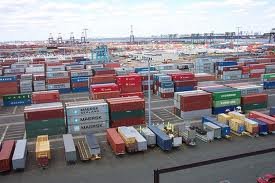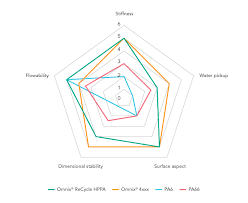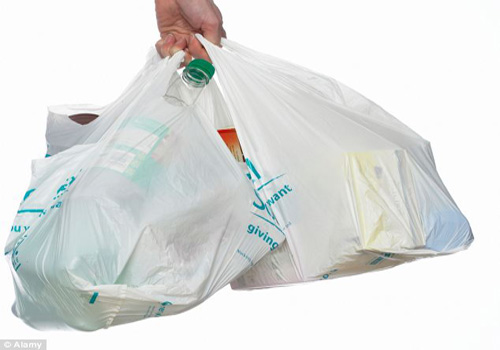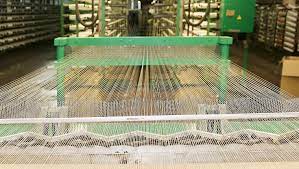Recently, plastics recycling company Coll Materials, based in Zanesville, Ohio, has been
undergoing a growth spurt. In May the state of Texas, through its Texas Enterprise Fund, announced that it was investing $550,000 in the company so it could open a plastics recycling facility in Waco, Texas. In addition to that investment, the Waco City Council also said it would provide Coll Materials with a $400,000 financing package through its Economic Development Incentive Fund. The money will go toward updating and renovating an existing building to meet Coll’s needs.
Coll Materials’ expansion into Texas is the most recent since its founders, Brian and Renée Coll, first opened the company in late 2007. And it likely will not be the company’s last.
GUIDING STAR
Brian, who serves as president and CEO of Coll Materials, says the company’s expansion into Waco will allow it to grow its business in the Southwestern United States and Mexico.
A key reason for expanding to the Southwest is the importance of reducing transportation costs, Brian says. “This allows us to provide recyclers with a steady flow of materials west of the Mississippi and save our customers freight costs they would have to incur to ship their feedstock to the Zanesville plant. It also expands the buying region for Coll to west of the Mississippi,” he says.
The regional approach to the business, the Colls say, is a key to success. “We believe that the future of plastics recycling will be regional,” Renee says. “We’re converting our operations to this approach now. By having multiple plants throughout the country, we can reduce our carbon footprint because we’re not transporting material extreme distances. This gives us an advantage over large companies that only process in one facility.”
Brian adds, “The traditional radius to cost-effectively supply a plastics recycling facility is around 400 miles.”
Coll Materials already has its eye on other markets. The company’s executives have begun research and due diligence into a possible Portland, Ore., location.
The Waco plant will be similar in size to the company’s main plant in Ohio and will have two wash lines, three plastic extruders to make pellets, four granulator lines, seven silos for material storage and rail access.
Brian says he expects that when the Waco plant is fully operational it will process nearly 100 million pounds of plastics per year. Including the investment from the state, it is estimated that the total investment in the Waco plant will be nearly $6 million.
The Waco plant is expected to process high-density polyethylene (HDPE), polypropylene (PP), ABS (acrylonitrile butadiene styrene) and other plastic resins. Brian says he expects the plant to receive a large volume of feedstock from Mexico because of the company’s existing relationships with auto manufacturers in that country.
Coll Materials currently processes nearly 100 million pounds of industrial and post-consumer plastics per year at its Zanesville plant.
The company also is in final contract negotiations to acquire Nicos Polymers, Nazareth, Pa. Brian says the deal for the plant, which has nearly 100 million pounds of scrap plastics processing capacity per year, is expected to be complete before June.
The company’s recent growth is impressive, especially when one considers that only three years ago Coll Materials began as a brokerage business operating out of Brian’s home office.
SWEAT EQUITY
Coll Materials may be fairly new, but Brian and Renée are not new to the plastics industry. They first met when they worked at the plastics thermoforming firm Fabri-Form Co., New Concord, Ohio.
Prior to starting Coll Materials, Brian had worked at plastics companies and had been involved in turning around failing companies. He decided in late 2007 to strike out on his own.
Brian’s initial foray into entrepreneurship began with brokering various types of plastic scrap. With the money he earned, he purchased a small grinder and rented a 50,000-square-foot warehouse in Byesville, Ohio, that allowed his company to start producing and selling recycled plastic pellets. Brian purchased a second grinder using the money he earned through the sale of the material produced by the company’s first grinder.
From this modest start, the Colls expanded their business with the acquisition of Detroit-based Regrind Services in 2009. The acquired company’s equipment was relocated to a 150,000-square-foot facility in Zanesville.
In April 2009, Coll Materials received a business and industry loan guarantee of $618,600 through a program administered by the U.S. Department of Agriculture’s Rural Development agency. The loan enabled the company to purchase additional equipment for its Zanesville plant, further expanding its operations.
GROWTH AMID UNCERTAINTY
As Coll Materials was scaling up its operations, it began to feel the effects of the economic meltdown in late 2008.
For companies seeking growth, access to capital is invaluable. However, Brian says large banks were not willing to loan money, especially to a startup. Eventually, Coll Materials was able to establish a relationship with a small, regional bank, The Community Bank in Zanesville, which provided financing. Brian says Coll Materials was able to obtain low-interest financing and tax abatements.
Coll Materials remained on the lookout for opportunities to grow its business and found one earlier this year in the form of acquiring the business of Nicos Polymers, an industrial plastics recycling company that recently had exited Chapter 11 bankruptcy protection. Once the company emerged from Chapter 11, Coll Materials began the acquisition process.
Brian says Nicos Polymers was an enticing acquisition because of the company’s unique pulverizing technology, which will give Coll Materials an advantage when it comes to supplying consumers in the Southwest. “We have the latest and greatest [technology],” he says. “We have granulating lines, single- and dual-shaft shredders, aspirators to remove fines and dust.”
UPGRADING OPERATIONS
Since opening its Zanesville plant in July 2009, Coll Materials has invested nearly $8 million to strengthen its HDPE recycling. In late 2010, the company decided to install multiple plastic extruders at its Zanesville facility to produce post-consumer fractional-melt HDPE pellets.
“In addition to increasing our capacity so that we can offer higher volumes to our customers, it allows us to offer our customers a value-added product,” according to Brian.
Along with the extruders, Coll Materials also has purchased a shredder, which should help to boost production on its grinding lines. A second washing line, which features an 80-foot water tank, also has been custom built for the post-consumer line at the Zanesville plant.
“We now have 36 granulators that average between 3,000 to 4,000 pounds per hour. From one wash line, we now have six wash lines and 10 pelletizing lines,” Brian says of Coll Materials’ growth.
Bob Morrow, Coll Materials vice president of operations, says, “The new equipment and upgrades in technology and engineered systems will allow us to become more efficient in manufacturing, allowing us to process more material for our customers and giving us the freedom to buy in larger quantities.”
The company also is adding three 8-inch extruders that will give its Zanesville plant the ability to re-pelletize 40 million pounds of plastics per year. “We previously only sold flake,” Brian says. “This allows us to expand our customer base, because some customers only want pellets.”
Brian says Coll Materials produces roughly a dozen different secondary plastics. “We densify, we blend and we pulverize. We are a one-stop shop.”
Coll Materials’ Zanesville, Nazareth and Waco facilities can process rou
ghly 100 million pounds of plastics per year and employ nearly 180 people in total.
The company’s growth also has been reflected in its sales, which increased from $4 million in 2009 to $10 million in 2010. According to one news report, Coll Materials plans to reach $40 million in sales once its Waco plant is completely operational.
Coll Materials’ plants do not necessary operate as autonomous facilities and resources are relocated to where they can be put to the best use. For example, Brian says the pulverizing technology the company is inheriting with the purchase of Nicos Polymers is ideally suited to a large customer in the Southwest. By transporting that technology to its Waco plant, Coll Materials says it has landed a 12 million pound account with the largest garden hose manufacturer in the United States.
MAKING THE GRADE
With the company’s philosophy of running with reduced inventory on hand, ensuring a steady supply of quality material is a challenge it deals with regularly, which is why Coll Materials has 10 buyers located throughout the country.
Declining material quality is a growing concern for Coll Materials, Brian says. To address this issue, the company provides education and training to its suppliers. “Quality is a big issue. We try to hold our vendors to our standards. We let them know that if the losses are over the standards, we can dock them,” he says.
Despite these challenges, Brian says he feels Coll Materials will continue to prosper. He says the key to Coll Materials’ success is to be over-prepared and to over-perform.
“We fit in the top ranks now. We are looking at the future, which is very bright,” Brian adds.
Source : www.recyclingtoday.com







